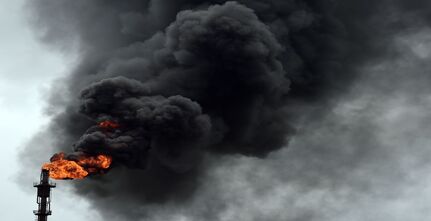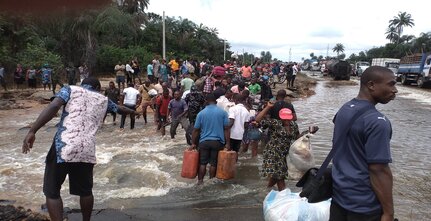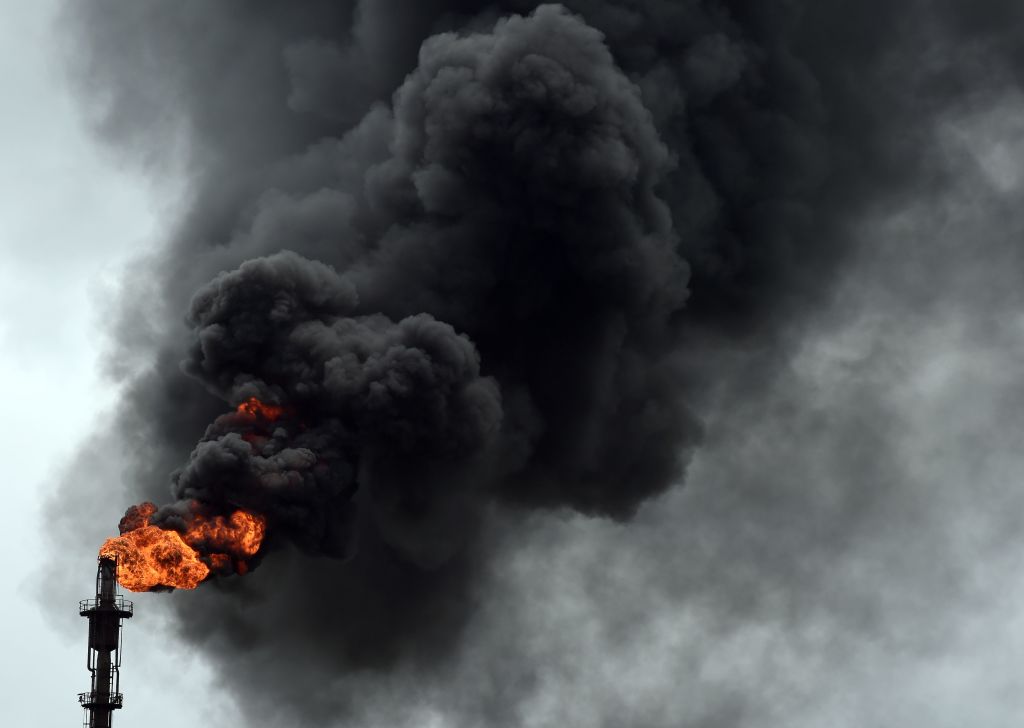
Climate change is a long-term change in the average weather patterns that have come to define Earth’s local, regional, and global climates. These changes have a broad range of observed effects that are synonymous with the term. Climate change is caused by factors that include oceanic processes (such as oceanic circulation), variations in solar radiation received by Earth, plate tectonics and volcanic eruptions, and human-induced alterations of the natural world; these latter effects are currently causing global warming, and “climate change” is often used to describe human-specific impacts.
The Niger Delta is a region in southern Nigeria that is home to a large population and a rich ecosystem. The region is particularly vulnerable to the impacts of climate change, due to its low-lying geography, high population density, and reliance on natural resources.
The impacts of climate change in the Niger Delta are already being felt. These impacts include:
More frequent and intense flooding: The Niger Delta is already experiencing more frequent and intense flooding. This is due to a combination of factors, including rising sea levels, increased rainfall, and deforestation. Flooding is displacing people from their homes, destroying crops, and damaging infrastructure. See Figure 2 below;

Figure 2 showing intense flooding at Bayelsa State 2022
Rising sea levels: Rising sea levels are also a major threat to the Niger Delta. The region is home to a large number of coastal communities, which are at risk of being inundated by rising sea levels. Rising sea levels are also threatening coastal infrastructure, such as roads, bridges, and airports.
Changes in rainfall patterns: The Niger Delta is also experiencing changes in rainfall patterns. The region is becoming drier in some areas, while other areas are becoming wetter. These changes are making it difficult for farmers to grow crops and are also affecting the availability of water for drinking and irrigation.
Deforestation: Deforestation is also a major problem in the Niger Delta. Deforestation is increasing due to the expansion of agriculture, logging, and oil and gas extraction. Deforestation is contributing to climate change by releasing carbon dioxide into the atmosphere. It is also leading to soil erosion and flooding.
Pollution: Pollution is also a major problem in the Niger Delta. The region is home to a number of oil and gas pipelines, which leak oil and other pollutants into the environment. Pollution is harming the health of people and wildlife in the region.
The impacts of climate change in the Niger Delta are having a devastating impact on the environment, the people, and the economy of the region. More needs to be done to mitigate the impacts of climate change and to help the people and the economy of the Niger Delta adapt to the changing climate.
Sources info:
1)ecepiqw.refugees-backnang.info/0
2)www.academia.edu/5935668/Effect_of_Climate_Change
The main causes of climate change in the Niger Delta are:
Rising greenhouse gas emissions: The Niger Delta is a major contributor to greenhouse gas emissions. These emissions are released from a variety of sources, including oil and gas extraction, deforestation, and agriculture. Greenhouse gases trap heat in the atmosphere, which is causing the planet to warm. See Figure 3 below;

TO GO WITH AFP STORY BY FLORIAN PLAUCHEUR Thick black smoke billows from a pencil-thin chimney at the Port Harcourt Refining Company Limited, Rivers State, on September 16, 2015. The Port Harcourt refinery is Nigeria’s oldest, built in 1965, nine years after crude was first found under the marshy soil and creeks of the delta, where the Niger river meanders to the Gulf of Guinea. Refineries in nearby Warri and Kaduna in the north central region were built in the years that followed, while a new plant was added to the same site in Port Harcourt in 1989. In recent years, however, it became a byword for corruption, a murky, state-run body where billions of dollars in revenue apparently disappeared. AFP PHOTO/PIUS UTOMI EKPEI (Photo by Pius Utomi EKPEI / AFP) (Photo by PIUS UTOMI EKPEI/AFP via Getty Images)
Deforestation: Deforestation is a major problem in the Niger Delta. Deforestation is increasing due to the expansion of agriculture, logging, and oil and gas extraction. Deforestation is contributing to climate change by releasing carbon dioxide into the atmosphere. It is also leading to soil erosion and flooding.
Pollution: Pollution is also a major problem in the Niger Delta. The region is home to a number of oil and gas pipelines, which leak oil and other pollutants into the environment. Pollution is harming the health of people and wildlife in the region.
Natural factors: The Niger Delta is also affected by natural factors that contribute to climate change. These factors include the El Niño-Southern Oscillation (ENSO) and the Atlantic Multidecadal Oscillation (AMO). ENSO is a climate pattern that causes changes in rainfall and temperature in the Pacific Ocean. The AMO is a climate pattern that causes changes in rainfall and temperature in the Atlantic Ocean.
The most significant impacts of climate change in the Niger Delta include:
More frequent and intense flooding: The Niger Delta is already experiencing more frequent and intense flooding. This is due to a combination of factors, including rising sea levels, increased rainfall, and deforestation. Flooding is displacing people from their homes, destroying crops, and damaging infrastructure.
Rising sea levels: Rising sea levels are also a major threat to the Niger Delta. The region is home to a large number of coastal communities, which are at risk of being inundated by rising sea levels. Rising sea levels are also threatening coastal infrastructure, such as roads, bridges, and airports.
Changes in rainfall patterns: The Niger Delta is also experiencing changes in rainfall patterns. The region is becoming drier in some areas, while other areas are becoming wetter. These changes are making it difficult for farmers to grow crops and are also affecting the availability of water for drinking and irrigation.
Deforestation: Deforestation is also a major problem in the Niger Delta. Deforestation is increasing due to the expansion of agriculture, logging, and oil and gas extraction. Deforestation is contributing to climate change by releasing carbon dioxide into the atmosphere. It is also leading to soil erosion and flooding.
Pollution: Pollution is also a major problem in the Niger Delta. The region is home to a number of oil and gas pipelines, which leak oil and other pollutants into the environment. Pollution is harming the health of people and wildlife in the region.
Loss of biodiversity: The Niger Delta is home to rich biodiversity, including a number of endangered species. Climate change is threatening the biodiversity of the region by reducing the availability of habitat and food.
Health impacts: Climate change is also having a negative impact on the health of people in the Niger Delta. Climate change is increasing the risk of heat stress, vector-borne diseases, and waterborne diseases.
Economic impacts: Climate change is also having a negative impact on the economy of the Niger Delta. Climate change is disrupting agricultural production, reducing tourism, and increasing the cost of infrastructure repairs.
How Climate Change Affects Our Environment
The environment of the Niger Delta is being degraded by climate change. Deforestation is increasing, pollution is worsening, and the mangrove forests are being lost. These changes are threatening the biodiversity of the region and the livelihoods of the people who depend on the environment for their survival.
How Climate Change Affects Our People
The people of the Niger Delta are also being affected by climate change. More frequent and intense flooding is displacing people from their homes and destroying their crops. Rising sea levels are threatening coastal communities and coastal infrastructure. Changes in rainfall patterns are making it difficult for farmers to grow crops.
The implications of environmental changes for the people and economy of the Niger Delta are numerous and severe. These implications include:
Displacement: Climate change is displacing people from their homes in the Niger Delta. This is due to flooding, rising sea levels, and deforestation. Displacement is causing people to lose their homes, their livelihoods, and their sense of community.
Food insecurity: Climate change is also causing food insecurity in the Niger Delta. This is due to changes in rainfall patterns, flooding, and pollution. Food insecurity is making it difficult for people to get enough to eat, and it is also causing malnutrition and disease.
Health impacts: Climate change is also having a negative impact on the health of people in the Niger Delta. This is due to heat stress, vector-borne diseases, and waterborne diseases. Climate change is also making it more difficult to treat diseases, as the availability of healthcare is limited in the region.
Economic impacts: Climate change is also having a negative impact on the economy of the Niger Delta. This is due to disruptions in agricultural production, tourism, and infrastructure. Climate change is also making it more difficult to attract investment to the region.
Loss of biodiversity: The Niger Delta is home to rich biodiversity, including a number of endangered species. Climate change is threatening the biodiversity of the region by reducing the availability of habitat and food. This is having a negative impact on the livelihoods of people who depend on the natural resources of the region.
These are just some of the implications of environmental changes for the people and economy of the Niger Delta. These implications are likely to worsen in the future, as the planet continues to warm. It is important to take action to address climate change in the Niger Delta. The region is already experiencing the impacts of climate change, and these impacts are likely to worsen in the future. By taking action now, we can help to mitigate the impacts of climate change and protect the people and economy of the Niger Delta.
How Climate Change Affects Our Economy
The economy of the Niger Delta is also being affected by climate change. The oil and gas industry, which is a major source of income for the region, is being affected by the loss of mangrove forests and the rising sea levels. Agriculture and fishing, which are other important sources of income for the region, are also being affected by climate change. Here are some of the impacts of climate change on the economy of the Niger Delta:
Disruptions in agricultural production: Climate change is disrupting agricultural production in the Niger Delta. This is due to changes in rainfall patterns, flooding, and pollution. Crop yields are declining, and food prices are increasing. This is having a negative impact on the livelihoods of farmers and fishermen, and it is also making it more difficult to feed the region’s growing population.
Loss of tourism revenue: Climate change is also having a negative impact on tourism revenue in the Niger Delta. This is due to flooding, pollution, and the degradation of the environment. Tourists are less likely to visit the region, which is leading to a loss of jobs and revenue.
Damage to infrastructure: Climate change is also damaging infrastructure in the Niger Delta. This is due to flooding, erosion, and extreme weather events. Roads, bridges, and other infrastructure are being damaged, which is making it more difficult to transport goods and people.
Increased costs of adaptation: Climate change is also increasing the costs of adaptation in the Niger Delta. This is due to the need to build seawalls, levees, and other infrastructure to protect against flooding. It is also necessary to invest in new agricultural technologies to adapt to changing rainfall patterns.
These are just some of the impacts of climate change on the economy of the Niger Delta. The impacts of climate change are likely to worsen in the future, as the planet continues to warm. It is important to take action to address climate change in the Niger Delta, in order to protect the economy of the region
What needs to be done to mitigate the impacts of climate change by the government
The government of Nigeria is taking some steps to address climate change in the Niger Delta. However, more needs to be done to mitigate the impacts of climate change and to help the people and the economy of the Niger Delta adapt to the changing climate. Here are some of the ways that the government can address climate change in the Niger Delta:
Reduce greenhouse gas emissions: The government can reduce greenhouse gas emissions by investing in renewable energy sources, such as solar and wind power. The government can also promote energy efficiency measures, such as insulation and energy-saving appliances.
Protect forests: Forests play an important role in absorbing carbon dioxide from the atmosphere. The government can protect forests by establishing protected areas and by enforcing laws against deforestation.
Adapt to the changing climate: The government can help communities adapt to the changing climate by providing early warning systems for extreme weather events, such as floods and droughts. The government can also help communities develop disaster preparedness plans.
Invest in research and development: The government can invest in research and development to find new ways to address climate change. This could include research into new renewable energy technologies, or research into ways to make agriculture more resilient to climate change.
Engage with the private sector: The government can work with the private sector to develop climate-friendly businesses and industries. This could include providing tax breaks or other incentives for businesses that invest in renewable energy or energy efficiency.
Conclusion
Climate change is a serious threat to the Niger Delta. The region is already experiencing the impacts of climate change, and these impacts are likely to worsen in the future. The government has a vital role to play in addressing climate change in the Niger Delta. By taking action on these issues, the government can help to protect the environment and the people of the region.
Here are some key takeaways from this page:
Climate change is having a negative impact on the people, economy, and environment of the Niger Delta.
The impacts of climate change are likely to worsen in the future.
The government has a vital role to play in addressing climate change in the Niger Delta.
There are a number of things that the government can do to address climate change, such as reducing greenhouse gas emissions, protecting forests, and adapting to the changing climate.
It is important to take action to address climate change in the Niger Delta. The region is already experiencing the impacts of climate change, and these impacts are likely to worsen in the future. By taking action now, we can help to protect the environment and the people of the region.
